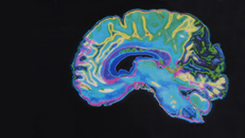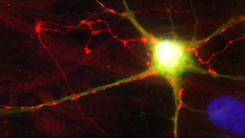HOW CAN WE HELP YOU? Call 1-800-TRY-CHOP
Lifespan Brain Institute Research Overview
The Lifespan Brain Institute team’s areas of research include behavior, cognition, neuroimaging, mental health, trauma, suicide, environmental risk factors, prenatal risk factors, resilience, genetics — including 22q and other rare copy number variants, epigenetics, animal models, and others.

The Psychosis Prevention Program at CHOP, led by Jerome Taylor, MD, aims to develop interventions to prevent psychotic disorders such as schizophrenia and bipolar disorder with psychotic features in youth with elevated psychosis risk. While the biological mechanisms of emerging psychosis remain unknown, their research program focuses on the mechanisms of oxidative stress, neuroinflammation, and circadian rhythm.

Led by Ran Barzilay, MD, PhD, BarziLab, strives to understand what drives variability in the development of brain and behavior in children and adolescents who develop under stress. They are especially interested in elucidating mechanisms of risk and resilience leading to youth suicidal behavior. Using large datasets of youth who have been genotyped and deeply phenotyped, the lab studies how a myriad of environmental exposures (such as trauma and poverty) dynamically interact amongst themselves (i.e., exposome), as well as with biological factors (genetic, epigenetic, immune) to drive suicidal behavior. They are committed to conduct impactful translational science that will help reduce teen suicide.

The BBL Brain Imaging Lab is a research unit in the Neurodevelopment and Psychosis section of the Department of Psychiatry at the University of Pennsylvania, which includes the Neuroimaging and Cognitive Core and the Lifespan Informatics and Neuroimaging Center. The primary mission of the lab is to better understand the pathophysiology of brain dysfunction, particularly in neuropsychiatric and aging populations, by utilizing advanced neuroimaging and psychophysical testing to evaluate brain-behavior associations. The ultimate goal of the BBL Brain Imaging Lab is to use multi-modal cognitive neuroscientific approaches to facilitate early identification of individuals at-risk for neuropsychiatric or neurodegenerative disease.

Led by Aaron Alexander-Bloch, MD, PhD, the Brain-Gene-Development Lab investigates normal brain development and the altered developmental trajectories that lead to mental illness, using a multi-disciplinary approach that integrates brain imaging, genomics, and clinical information. The lab's goal is to translate the highly polygenic risk for psychosis and other neurodevelopmental psychiatric disorders into pathophysiologic mechanisms, to inform therapeutic targets and improve risk assessment. Some current projects include:
- Developing lifespan brain growth charts of MRI morphological features (n>100,000 scans).
- Investigating the influence of copy number variants and polygenic risk on brain development and psychiatric risk, in large open datasets.
- Integrating clinically acquired brain MRI at CHOP and with natural language processing of the electronic health record.

The Neurodevelopment Section (IGNITE), a collaboration between Penn OBGYN and LiBI, aims to understand the influence that multiple domains of the exposome have on developmental trajectories, with a particular focus on early development. The IGNITE team is currently conducting a longitudinal study of pregnant individuals, following the both the parent and child over time to understand how the exposome shapes social and emotional development. The Neurodevelopment section uses a risk and resilience framework to capture the factors and processes that increase or protect against maladaptive developmental outcomes.

In collaboration with CHOP's 22q and You Center and others, LiBI conducts research 22q11.2 deletion syndrome and other rare copy number variants to better understand what causes the disorders, how to improve the lives of children and families affected by it, and how to help doctors identify and intervene as early as possible. Through these efforts, LiBI researchers hope to find a way to treat or even prevent these genetic disorders in the future.

In collaboration with Laura Almasy, PhD, and others, LiBI conducts genetic and epigenetic research. Research on genetics can help identify what genes may be risk factors for developing mental health and other disorders and may also help identify a way to prevent or treat those disorders. Research on epigenetics, the study of how behaviors and environments can change gene expression without changing the actual DNA sequence, can increase our understanding of environmental factors and how they can either pose a risk to developing mental health disorders or help protect against developing mental health disorders.

The Anderson Lab conducts research on molecular and cellular mechanisms that govern the development of the mammalian forebrain in relation to neuropsychiatric disease. Stewart Anderson, MD, studies the development of the cerebral cortex working with mouse genetics, forebrain slice and dissociated culture techniques, and mouse and human embryonic stem cells in cell culture and transplantation experiments. His research also includes studies on mitochondrial deficits in iPS derived neurons from patients with schizophrenia and the 22q11 deletion syndrome.